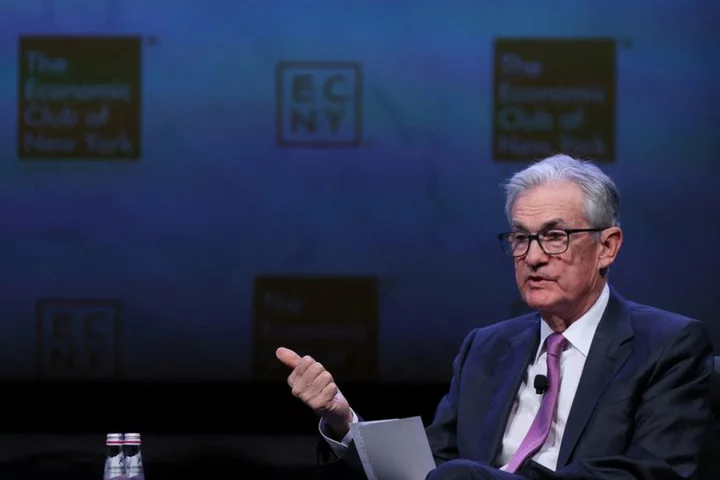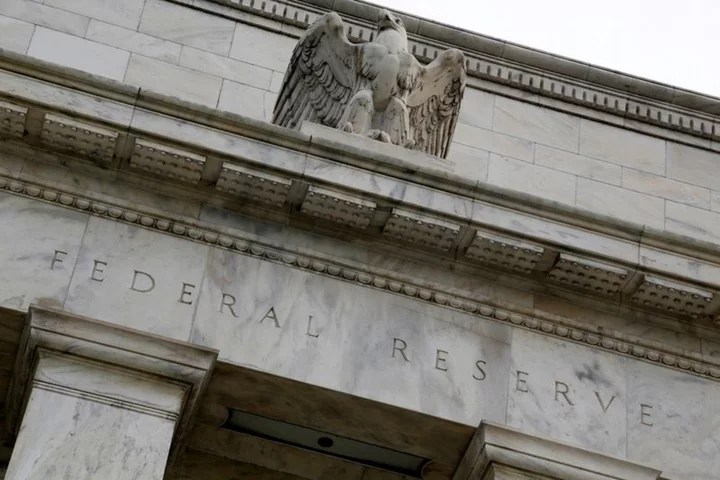By Davide Barbuscia and David Randall
A hawkish lean from Federal Reserve Chair Jerome Powell chilled a recent rebound in stocks and bonds, with some investors suggesting the central bank was pushing back against loosening financial conditions.
Speaking at an International Monetary Fund conference on Thursday, Powell said the Fed would "not hesitate" to tighten monetary policy if needed and that the fight to restore price stability "had a long way to go."
Though the comments did not go much beyond those given after the Fed's Oct. 31 - Nov. 1 monetary policy meeting, some investors believe Powell’s tone was more hawkish compared with those earlier remarks, which contributed to last week's powerful rebound in stocks and Treasuries.
By contrast, the S&P 500 fell 0.8% on Thursday, snapping an eight-day winning streak that was its longest in two years. Yields on the benchmark 10-year Treasury, which move inversely to bond prices, rose 12 basis points, their largest one-day gain in three weeks.
"Powell seemed to be course-correcting some of the dovish comments from last week and circling back to the idea that the Fed is prepared to raise rates again if they need to," said Charlie Ripley, senior investment strategist for Allianz Investment Management.
Some investors said Powell may have been leaning against a recent loosening of financial conditions that has come as yields have tumbled in recent weeks. The benchmark 10-year Treasury yield has fallen nearly 40 basis points to 4.63%, from a 16-year high of just above 5%.
Evidence of the dynamic between yields and financial conditions - factors that reflect the availability of funding in an economy - was on display in last week's 0.5% decline in the Goldman Sachs Financial Conditions Index, its sixth-biggest weekly drop since 1990.
Average rates on 30-year mortgages, which move together with Treasury yields, fell 25 basis points last week, the largest weekly tumble in nearly 16 months. Meanwhile, the S&P 500 is up 5.5% from its October lows.
"The noticeable drop in yields from last week may have caused some caution at the FOMC, which then led Chair Powell … talking up yields again," said Spencer Hakimian, CEO of Tolou Capital Management, a New York-based macro hedge fund.
"If their concept is to have tighter financial conditions, they can’t really let those yields go down. They need them to stay restrictive in order to not actually have to raise rates," he said.
Sonal Desai, chief investment officer of Franklin Templeton Fixed Income, echoed that sentiment, saying the Fed was trying to calm "an exuberance" it unintentionally created in the markets.
"The rally of the markets both in equity and fixed income unwound the financial conditions tightening to a large degree," Desai said. "This is Powell pushing back against markets trying to put into his mouth the words ‘mission accomplished.'"
At the same time, the weakest auction for 30-year Treasuries since August 2011 also hit government bond prices. Yields on the 30-year Treasury recently stood at 4.77%, from a low of 4.6% earlier this week.
"The rates market was still somewhat jittery after the auction so higher yields were the path of least resistance," said Vassili Serebriakov, a foreign exchange strategist at UBS.
Investors are awaiting U.S. consumer price data next week, which could show how the Fed is faring in its fight to keep lowering inflation from last year’s multi-decade highs.
"Chairman Powell issued a warning to investors too giddy on the prospect of rate cuts next year," said Jeffrey Roach, chief economist for LPL Financial, in a note. However, "next week’s inflation data should provide some salve for the markets as headline inflation will likely be soft from easing energy prices."
(Reporting Davide Barbuscia and David Randall; Additional reporting by Saqib Iqbal Ahmed and Karen Brettell; Writing by Ira Iosebashvili; Editing by Sam Holmes)









